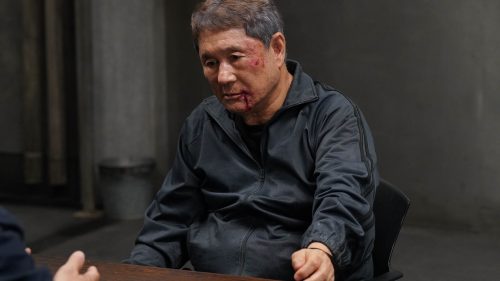
The Sensei returns home. The Venice Film Festival is where his international acclaim first took root and where he has showcased many of his extraordinary films. Sarcastic, provocative, and often self-mocking, Kitano is fiercely critical of Japan, yet like Fassbinder, who never strayed far from his beloved and despised Munich, Kitano too remains tethered to his homeland. Despite his critical stance, Kitano’s films are infused with unexpected glimpses of profound humanity and tenderness, which consistently surprise and move viewers. Together with Yukio Mishima in literature, Kitano is considered one of the most influential figures in a critical and nonconformist movement, especially in its opposition to the Westernization of Japanese society, which he finds alienating and obtuse.
As paradoxical as it may seem, “beat” Takeshi began as a comic actor, although his primary passion is painting. True to the tradition of great filmmakers, Kitano’s artwork, often featuring the recurring motif of the sea, reflects the core themes of his films and challenges conventional clichés, stylistic norms, and the status quo.

“A surprising exercise in metacinema,” is how Alberto Barbera described the new work by the legendary Japanese director. Divided into two parts, the film relies on an unusual narrative structure. The first half is a violent action film centered around a hitman caught betwe...
Lost souls searching for meaning, converge in the climax of a surreal and magnificent ballet of men and sumo-style puppets, as the theme of the sea makes its return.
A whirlwind of cruel and chaotic situations unfolds, with no protagonist displaying even a hint of humanity, resulting in a tragic yet very sweet ending with suicide by the inevitable sea. Winner of the Golden Lion, Venice 1954.
Once again, Kitano challenges the audience with a gripping tale of abandonment and reunion. The film follows two profoundly different characters as they navigate their loneliness in a Japanese road movie.
Cold, detached, and almost aphonic: a love that seems impossible between a boy and a girl, who are bound to each other, not just metaphorically, but forever. A silent and rarefied poetry.
Is the wayfaring masseur truly blind, or is this merely his defense against the foolish and venal world around him? The film blends pure violence with dark humor, culminating in a spectacular ballet. Winner of the Silver Lion, Venice 1960.